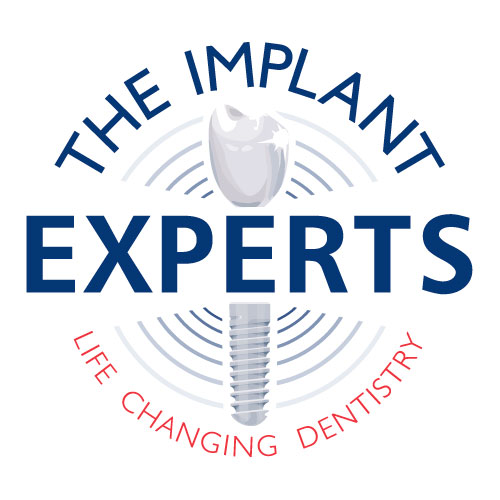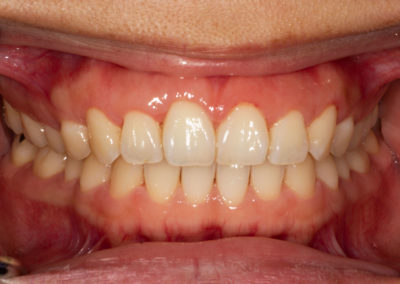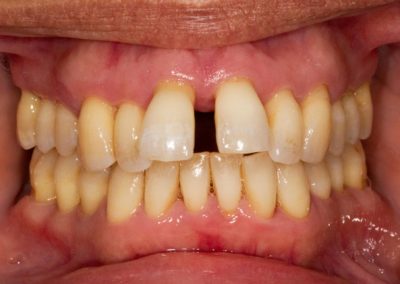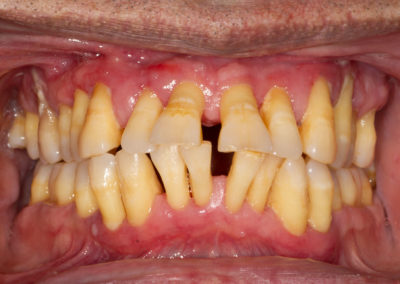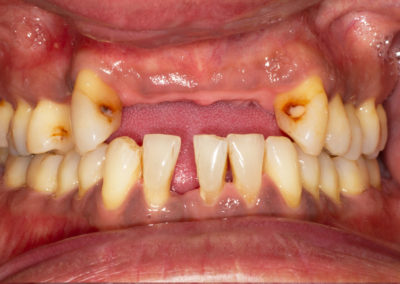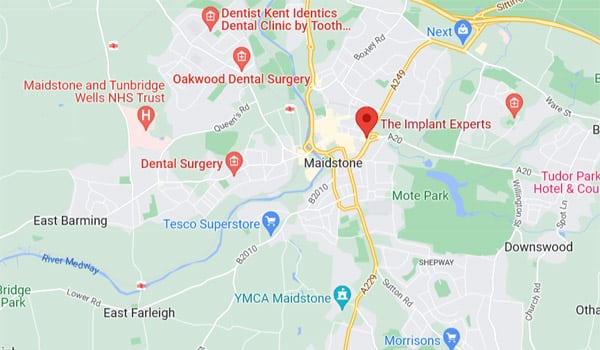GUM DISEASE
Even as implant experts, we will always apply our periodontics expertise to save your natural teeth if possible
What is gum disease?
Gum disease is your body’s inflammatory response to the build-up of plaque (a sticky film of bacteria) around your teeth and gums.
Hear from our expert…
What is gum disease? VIDEO (59 seconds)
This sequence of images shows the progression from a healthy mouth to eventual tooth loss:
Healthy gums with a pink colour and no sign of bleeding or swelling. These teeth have not incurred any loss of gum or bone attachment. The teeth are firm with no mobility.
Periodontitis has resulted in the recession of gum around multiple teeth. The loss of bone and gum support around the teeth has led to drifting away from their original position. Large gaps are appearing between teeth.
Here we see the gums appearing extremely swollen and the progressive loss of bone around the teeth has resulted in significant displacement and drifting of the teeth. Teeth are beginning to develop painful abscesses and have become considerably loose.

This animation shows how the gum and bone can recede if the gum disease is left untreated, ultimately resulting in the tooth losing its support and eventually coming out.
Hear from our expert…
The different types of gum disease explained VIDEO (53 seconds)
It has two main forms – gingivitis and periodontitis:
Gingivitis
Gingivitis is the non-destructive inflammation of the gums. The gums become swollen, red and tender, with a tendency to bleed when you brush. If we catch it early, gingivitis can be reversed and no destruction to the supporting structures of the tooth will occur. However, if the early signs are ignored, it can escalate (often without warning) into the far more serious periodontitis.
Periodontitis
Periodontitis causes damage that is irreversible. It leads to the destruction of the structures supporting the teeth. It is characterised by the detachment of the gum from the teeth and the formation of deep gum ‘pockets’. As it is allowed to progress, periodontitis will lead to the loss of bone around your teeth. At best, treatment can manage the disease and arrest further degradation. At worst, your teeth will become painful to chew on, loosen and could fall out completely.
Once diagnosed, the condition remains with you for life and will need constant monitoring and control.
The risk factors for gum disease
Anything that adversely affects your body’s immune response to bacteria will increase your susceptibility to gum disease, and its severity and progression will be determined by the effectiveness of that response.
Well recognised risk factors for gum disease include smoking and poorly controlled diabetes.
Conversely a major factor in reducing your risk is to scrupulously follow a recommended oral health routine at home: we, as patients, can exert a powerful force against gum disease by inhibiting the build-up of plaque in the first place.
How we treat gum disease
Gingivitis is usually treated – and cured – by the hygienist, alongside your diligent following of the home oral health routine we will recommend.
Hear from our expert…
The treatment of gum disease VIDEO (59 seconds)
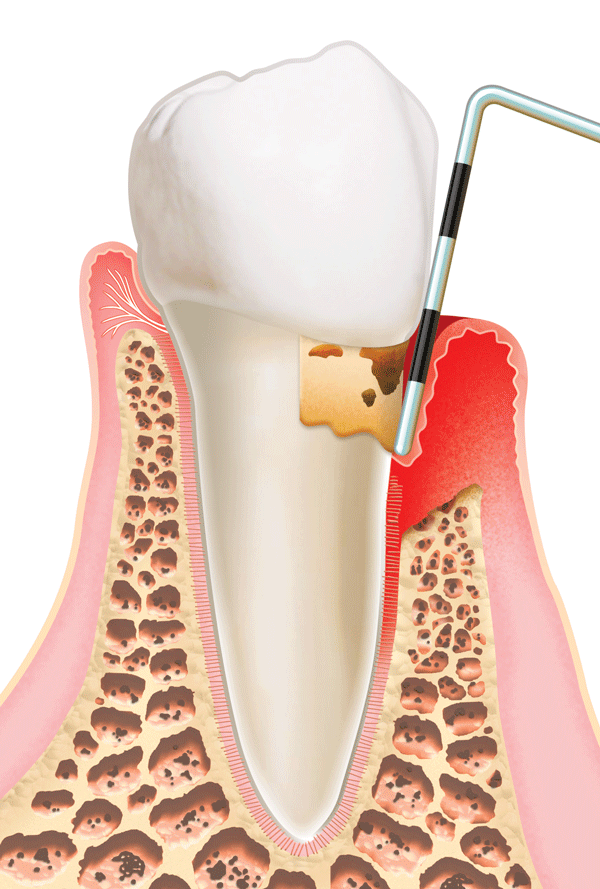
The more severe periodontitis requires specialist periodontal treatment and, in more extreme cases, surgery. This can involve deep cleaning those gum pockets that are inaccessible to the hygienist, and may require us to lift the gum clear, debride tooth roots and then replace and tighten a section of your gum. This will give your body a chance to heal the area, and make it easier for you to keep your teeth and gums clean at home.
Without regular check-ups, gum disease can develop almost unnoticed.
Gum disease treatment costs:
Clinical consultation
Radiographs – 2D / 3D (if required)
Treatment
£95
£10 – £200
From £360
Treatment costs:
Clinical consultation
£95
Radiographs – 2D / 3D (if required)
£10 – £200
Treatment
From £360
Saving your natural teeth
Although we work exclusively in implant dentistry, saving natural teeth, wherever feasible, remains our priority. That is why, at The Implant Experts, we offer a high degree of expertise in periodontology which enables us to treat severe gum disease. However, if the condition is too advanced for us to save your teeth, we are ideally placed to assess your viability for implant replacements and offer immediate advice and options.
Our approach to treating and preventing gum disease
Assessing the status quo. We examine your teeth and gums in detail, identifying any areas of potential concern. We also discuss how diet and smoking can adversely affect your dental health
- Reviewing your dental hygiene routine. We discuss how you currently care for your oral health on a daily basis
- Teaching you how to keep on top of your gum disease. We both explain and demonstrate the best ways of maintaining and improving your oral health at home. This includes correct use of the right type of toothbrush, and how and when to use interdental brushes (e.g. TePe) and dental floss
- Deep cleaning. Where necessary, we will deep clean your teeth and gums, accessing the hard-to-reach pockets where bacteria can thrive
- Taking detailed measurements. By accurately noting things like plaque levels, pocket depths and gum recession at the beginning of your treatment, we can check your progress against them at any stage thereafter.
Frequently asked questions
Can we cure gum disease?
We can generally cure gingivitis. However if it has progressed into periodontitis, any existing damage is irreversible: our treatment and your diligence can simply stabilise the condition. Once diagnosed, gum disease is with you for life.
How do we treat gum disease?
We seek to control the harmful bacteria by reducing and minimising plaque.
- We clean bacteria away from both above and below the gum line to reduce the inflammation, and sometimes use antibiotics to reduce bacterial levels
- We teach you the best methods for effective daily home cleaning of teeth and gums to remove bacteria
- If you have severe gum disease you may require surgical treatment to access deep pockets, remove inflamed gum tissue and bacterial deposits or to help grow bone around teeth
- We check and monitor your response to treatment to guard against recurrence.
What causes gum disease?
Gum disease is your body’s inflammatory response to plaque build-up (a sticky film of bacteria) around your teeth and gums.
Can gum disease be cured?
Gingivitis is usually reversible, but periodontitis is generally not curable: however it is treatable, manageable and, more importantly, preventable.
Is gum disease hereditary?
Yes, to an extent. Recent studies suggest that up to 30% of the population may have some genetic susceptibility to periodontal disease.
Can gum disease cause bad breath?
Yes, it is one possible cause. Bacteria that cause gum disease live below the gumline and can produce a volatile sulphur compound which is often responsible for bad breath.
What are the symptoms of gum disease?
Typically bad breath and bleeding gums. If you smoke, however, the absence of bleeding can be attributable to the effects of smoking (which, to a greater or lesser extent, constricts the blood vessels).
Is gum disease treatment painful?
No, although it may be a little uncomfortable: we do our utmost to limit any pain with a local anaesthetic. However it is certainly something that most people would prefer to avoid, if they can.
Is gum disease avoidable?
Usually, yes. Regular dental check-ups to assess your oral health and identify possible risk factors for gum disease can help you to prevent its occurrence. Although your individual susceptibility may predispose you to the development of gum disease, good and meticulous oral hygiene measures at home to prevent the build-up of plaque is often enough as prevention. Education by a dental health professional on the correct techniques of toothbrushing and interdental cleaning is of paramount importance to ensure you are doing the best you can at home.
3 Ashford Road
Maidstone
Kent
ME14 5BJ
